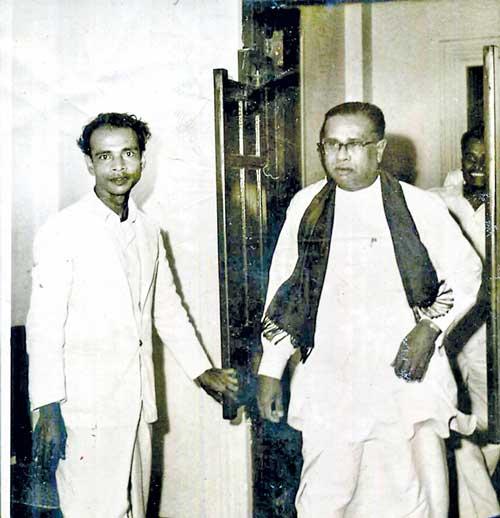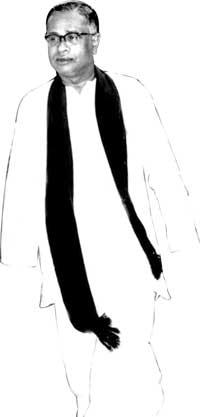05 Dec 2020 - {{hitsCtrl.values.hits}}
 Sri Lankans today yearn for well educated, cultured and efficient public servants and politicians. The vast majority of those who elect politicians though literate, are prone to have short memories. As a result, we have a parliament full of politicians who think of the next election only. Sri Lanka is bereft of statesmen who think of the next generation. In this regard, C P DE Silva is a role model for all politicians.
Sri Lankans today yearn for well educated, cultured and efficient public servants and politicians. The vast majority of those who elect politicians though literate, are prone to have short memories. As a result, we have a parliament full of politicians who think of the next election only. Sri Lanka is bereft of statesmen who think of the next generation. In this regard, C P DE Silva is a role model for all politicians.

He was born to a very respectable family in Balapitiya. He went on to earn much respect and became the undisputed leader of his community. He had his roots in the South. He won the Polonnaruwa seat with a landslide majority and was one of the 9 MPs elected in 1952 at the first election faced by the newly formed SLFP led by SWRD Bandaranaike.
He earned a very high reputation as a conscientious worker. He was loved and respected by the people of the NCP for working hands on, in the field as the AGA and GA and Land Commissioner. After he prematurely retired, CP took to farming in Puttalam in Thabowa. He was persuaded into taking up politics by people in Polonnaruwa; led by N L Wilmot Nanayakkara. On the invitation of SWRD Bandaranayake he joined the SLFP and was elected as an MP in 1952. This highly acclaimed public servant in an eventful political career became the Minister of Lands, Irrigation and Power and Leader of the House from 1956 to 1964 and from 1965 to 1970. He was the Deputy Leader of the SLFP during the governments of SWRD and Sirimavo Bandaranaike (1956 to 1965) and Leader of the SLFP for a short time in 1960 after SWRD was assassinated. He led the government in parliament from 1960 to 1964 when Mrs Bandaranaike decided to sit in the Senate instead of the House.

He passed away at the age of 60 on October 9, 1972- after offering 33 years of continuous service as a public servant and a politician in the Polonnaruwa district. For 14 years he was the Minister of Lands, Irrigation and Power and Leader of the House and was in charge of the Mahaweli diversion project as Minister. 48 years since his death, people still love him for his dedicated services. He showed empathy to farmers and the underpriviledged.
C.P De Silva was not a great orator, but spoke to the point. He was hampered in his speech after a poisoning attempt in the Cabinet room in 1959. But he made up for it with clinical arguments and well-constructed speeches.
De Silva had his primary education at Darmasoka College, Ambalangoda and joined S. Thomas’ College Mt Lavinia for his secondary education. He became a Gregory Scholar and received the coveted Miller award for his brilliance in science and mathematics. He also became the Head prefect at S.Thomas’. He won the Exhibition Scholarship to enter the University College, Ceylon and obtained the Bachelor of Science Degree with 1st class Honours in Mathematics. He proceeded to London for further studies and passed the Ceylon Civil Service exam with a 1st class. At the age of 23, he joined the prestigious Ceylon Administrative Service. CP belonged to a few breed of Parliamentarians with a very high academic credentials.
No politician had a record of service to the nation as DE Silva had. He was a contemporary of Dudley Senanayake and as a young Civil Servant, was handpicked by Prime Minister D S Senanayake, to deliver the government policy on agriculture in the North
Central Province.
When the Minneriya tank bund was about to burst with the potential to destroy Hingurakgoda and Madirigiriya, DE Silva took the risk when no one dared to try and cut the bund to direct the flood waters elsewhere. He jumped off the dozer and saved his life. Bits and pieces of the Dozer were found close to Medirigiriya. Fittingly he earned the gratitude of the people in the Polonnaruwa District and they referred to him as
“Minneriya Deviyo”.
DESilva’s service to the nation and personal sacrifices made will be a text book case study for a serious politician. He was also a gentleman politician. Dr Wijeyadasa Rajapakshe in a preface to his book on DE Silva, stated “Political leaders and governments come and go very often leaving all burning issues of the people unresolved. Family bandism and vituperative politics were the main cause of for this catastrophe. Crafty and unscrupulous nincompoops had eclipsed truly patriotic statesman. “With a disheartened mind on politicians of the past and present, I thought of scanning the political horizon to trace one who had served so much to the people and abstained from deception. Amongst those in that category the most outstanding and unassuming character that I found was nobody other than C. P. De Silva”.
Sri Lanka at political and economic cross roads today, would do well to assimilate some brave decisions taken by him which influenced the country’s democratic traditions.
It is well known that CP – a right of centre politician in the SLFP, opposed Mrs Bandaranaike’s decision to induct the LSSP and the Communist Party into her Cabinet in the latter part of her government. He was a SWRD Bandaranaike loyalist and his deputy and had survived an assassination attempt. He stood with his leader steadfastly when the leftist Trade Unions, stage managed by the LSSP and the Communist Party, tried hard to destabilzse the 1956 Bandaranaike Government. In fact, during the 1960 election campaign, Mrs B criticised the politics of the LSSP and De Silva as having ‘killed her husband without killing him’ and for insulting SWRD.
Diabolical intentions of the traditional left identified the soft spots in the political belly of Mrs B. This was proved with the introduction of the Press Bill in 1964. The Press Bill stated the new law would “provide for the appointment of a Ceylon Press Council to tender advice on matters relating to the press in Ceylon and for investigation of offences relating to the printing or publication of certain matters in newspapers and for the trial of such offences by the Press Tribunal and for matters connected therewith or incidental thereto”. After the introduction of the Press Bill, the government introduced draft legislation for the takeover of the Associated Newspapers of Ceylon( ANCL).
This was the last straw for De Silva who was somewhat distraught with Mrs B’s policies. While justifying his stance to close family and friends and political associates, he opposed the threat to Press freedom as an act that the country could not afford. He failed to influence his party and the Prime Minister, who by then was thinking of the next election and not the future of the generations to come. Lack of foresight made them use MPs such as Jaya Pathirana from within the SLFP, to criticise De Silva in Parliament. When the time came to decide, De Silva with 13 other SLFP members crossed the floor of the House on December 3, 1964. But he first resigned from the SLFP and all portfolios. This act resulted in the government being defeated in the Throne Speech by one vote. Mrs B dissolved parliament on December 17 1964.
Fortunately,the people endorsed the fall of the government at the ensuing poll on March 22, 1965. The UNP under Dudley Senanayake formed a National Government.
Politicians who pay lip service to democracy, voted for the 20th Amendment last month going back unashamedly to the JR Jayewardene Constitution. The same lot voted to remove the dictatorial powers of a President by passing the 17th, 18th and 19th amendments. History will remember the yahapalanaya government led by Sirisena and Wickremesinghe and the UNP and SLFP, for the steps taken to restore media freedom and many other features of democratic values and for the enactment of The Right to Information Act which the Rajapakse government was so shy to enact.
In his speech after crossing over De Silva stated “I might make whatever personal contribution I could, to ensure that our people shall continue to live as free men and I might continue to live as a free man amongst free men and as a protest against the attitude of the coalition towards the advice of the Maha sanga”.
Another aspect of De Silva’s political past unlike any other, was that he was deprived of the Premiership thrice. Dahanayake was appointed as the Prime Minister on the 27th September, without waiting for CP’s return from hospital. CP became the Leader of the Opposition. He was later offered the post of Prime Minister in gratitude for defeating Mrs B in Parliament and helping the UNP to win the elections. But CP’s simple reply was that people voted for the UNP and for its leader to be the PM. One cannot expect such genuine politicians today.
27 Nov 2024 29 minute ago
27 Nov 2024 38 minute ago
27 Nov 2024 59 minute ago
27 Nov 2024 1 hours ago
27 Nov 2024 2 hours ago